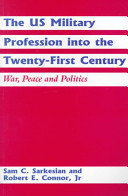
The US Military Profession Into the Twenty-first Century
By - Sarkesian, Sam C. (Sam Charles), 1927-2011 , Connor, Robert E.
Floor
-
Floor 1
Published
-
Frank Cass, London, ©1999
ISBN 10 - 0714644722
ISBN 13 - 9780714644721
Book Status
-
1 Qnty Available with us.
Subject
-
Connor, Robert E.
Shelf No
-
19
Call Number
-
355.0335 SAR
Physical Description
-
xiv, 222 pages ; 25 cm
Notes
-
Includes index.